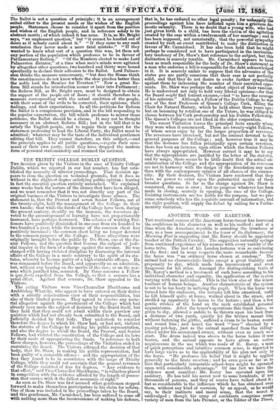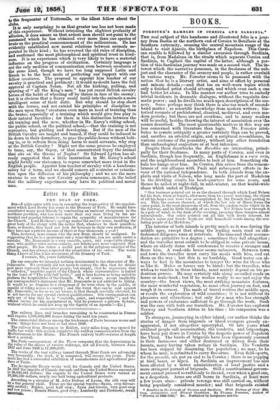ANOTHER WORD ON RAREYISM.
THE continued success of the American horse-tamer has increased the confidence in his character as well as his method ; and at a time when the American republic is sounding the trombone of war, as a bass accompaniment to the tenor of its diplomacy, the Morning Post is suggesting that Mr. Rarey should be appointed teacher of the BritisliCavalry. The suggestion naturally springs from continued experience of his success with every variety of the horse tribe. The last of his London lectures was as convincing as the first ; and in some respects the more -remarkable because the horse was "an ordinary horse chosen at random." The animal had no characteristic faults except a great timidity and propensity to shy, which made him inconvenient and even dangerous for his rider. Amongst the distinguishing traits of Mr. Rarey's method is a treatment of each horse according to his individual character and capacity, the application of the system varying with the individual. This is the view also of the wisest teachers of human beings. Another characteristic of the system is not to be too hasty in noticing the pupil. When the horse was turned into the enclosure, the lecturer left him unnoticed, until he felt himself quite at home, walked about in the straw, and strolled up apparently to listen to the lecture ; and then a few gentle strokes of the hand on the neck established personal acquaintance. After the tamer's operations this timid horse, so given to shy, allowed a saddle to be thrown upon his back from a distance of two yards, quietly let the trainer mount him without fastening the girths, suffered a drum to be beaten round and round him ; and heard the word " beer " shouted by a passing pot-boy, just as the animal marched from the riding- school under his accustomed owner, without even so much as a start. The dram indeed was shown to the horse before it was beaten, and the animal appears to have given an active acquiescence in the use which was made of it. Rarey, a man of quick perceptions and intuitive common sense, is reported to have large views as to the applicability of his plan not only to the horse. "He professes his belief that it might be applied generally to the brute creation ; and he even goes so far as to hint that particularly intractable school-boys might be operated upon with considerable advantage." Of one fact we have the evidence most manifest : Mr. Rarey has operated upon his auditory. He has told his secret now to some hundreds, if not thousands of persons, and they of course have talked about it but so considerable is the influence which he has obtained over them, without any kind of coercion, by an appeal, as he would -say, to their instincts and moral sense, that the secret is undivulged ; though his army of confidants comprises every variety of men from the late Premier, or the Editor of the Times, to the frequenter of Tattersalls, or the idlest fellow about the
clubs.
U is only . surprising to us that greater use has not been made of this experience. Without intending the slightest profanity of allusion, it does amaze ns that ardent men should not point to the command which he has obtained over more than one species of brute as the practical commencement of the millennium. He has evidently established new moral relations between animals se- parated in their kind ; he has reversed the old rules of discipline, and confirmed the most philosophical and spiritual trust in kind- ness. It is an experience which is very likely to have a material influence on the progress of civilization. Certainly language is not the only medium of communication even between creatures of the same kind, though we have too long supposed Latin and Greek to be the best mode of perfecting our rapport with our fellow creatures. The proposal to appoint him teacher of our cavalry is practical and pertinent ; it would no doubt have the full approval of Captain Nolan. Not all the kicking, pulling, and spurring of " all the King's men " has yet cured British cavalry horses of the habit of wheeling off by threes in face of the enemy; but it is obvious that a Rarey could instil into the animals a more intelligent sense of their duty. But why. should he stop short with the horses, and not extend his principles of discipline to the men upon them? creatures even more in need of training than the brutes, especially of a training which would give free play to their natural faculties ; for there is this distinction between the old training and the new, whether in Mr. Rarey's riding school, the public school, or the political school,—that the training is not repressive, but guiding, and developing. But if the men of the British Cavalry are taught and tamed, if they could be induced to lie down in their dormitory, to pass the public-house without bolt- ing in, or to refrain from doing harm to maid servants, why stop at the British Cavalry ? Might not the same process be employed to tame, say, the Sepoy, or that concentrated Sepoy the animal that sits on the throne of Naples ? Sir Edward Lytton has al- ready suggested that a little instruction in Mr. Rarey's school might fortify our statesmen to repose somewhat more trust in the English people. Appoint him teacher of cavalry with a handsome salary for a term, and we should remove all restraint or retarda- tion upon the diffusion of his philosophy ; and we are the more anxious to see the new Cavalry system commence, in the belief that the military experiment may have its political and moral uses.



























 Previous page
Previous page